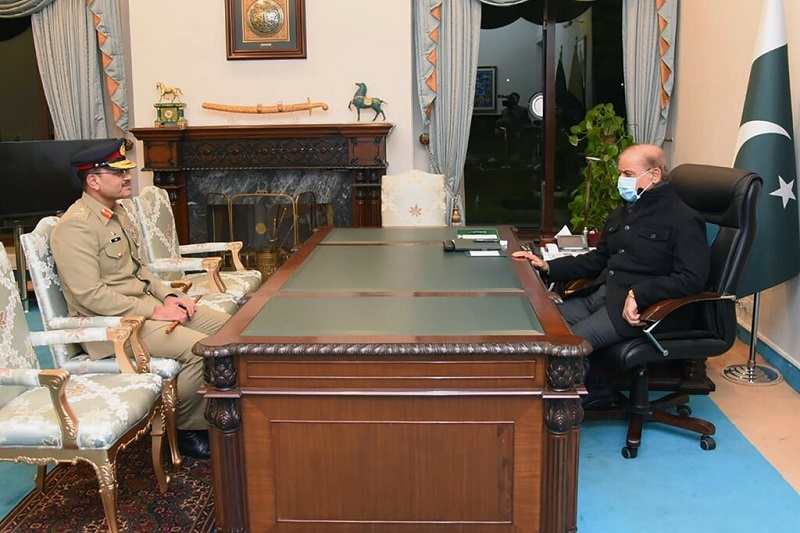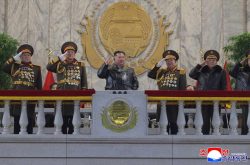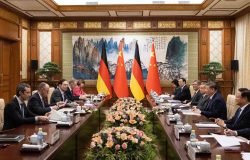
In this photo released by Pakistan’s Prime Minister office, newly appointed Army Chief, Gen. Syed Asim Munir, left, meets with Prime Minister Shahbaz Sharif, in Islamabad on Thursday.
12:15 JST, November 25, 2022
ISLAMABAD (AP) — Pakistani Prime Minister Shahbaz Sharif has named the country’s former spy chief as head of the military, the information minister said Thursday, ending months of speculation about the new appointment.
The army has historically wielded huge influence in Pakistan, ruling it for half of its 75-year history, and also oversees its nuclear program. Like neighboring China and India, Pakistan has nuclear arsenals and a missile system, mainly aimed at archrival India.
Asim Munir, who was promoted to four-star general and whose planned retirement was postponed replaces Gen. Qamar Javed Bajwa, whose extended six-year term ends on Nov. 29.
Munir begins his new role amid feuding between Sharif and his predecessor, former Prime Minister Imran Khan. The ex-premier has publicly accused Bajwa of playing a role in his ouster, a charge the outgoing army chief has denied.
Khan, a former cricket star turned Islamist politician, was ousted in a no-confidence vote in parliament in April. He is now in the opposition and has been demanding early elections, claiming his ouster was illegal and orchestrated by Sharif, with the U.S. government’s help. Sharif and Washington have dismissed the allegations and the current government says the next polls will be held as scheduled in 2023.
According to Information Minister Maryam Aurangzeb, Sharif also named Lt. Gen. Sahir Shamshad Mirza as the chairman of the Joint Chiefs of Staff Committee, replacing Gen. Nadeem Raza who retires this week.
President Arif Alvi later Thursday endorsed the appointments and congratulated Munir and Mirza on their promotions to four-star generals, according to a statement from the presidency.
Munir ran the Inter-Services Intelligence during Khan’s term in office but was fired without an explanation from the then-premier.
Earlier Thursday, Defense Minister Khawaja Mohammad Asif told reporters that Munir’s appointment was “based on merit, law and according to the constitution.”
Thursday’s appointments, Asif said, would “help our country and the economy to get back on the right track, as right now everything is at a standstill.”
According to constitutional experts, Alvi, a former member of Khan’s Tehreek-e-Insaf party, was bound to approve the appointments. However, he did have the option to delay his approval for 25 days, said one senior expert, Aitzaz Ahsan.
Azim Chaudhry, a senior political analyst, told The Associated Press that Munir held key positions under Bajwa, including as head of military intelligence. He said he hoped Munir would keep the military away from politics, in line with Bajwa’s policy.
Bajwa, in a recent televised address at an army gathering, called Khan’s conspiracy allegations a “false narrative.”
“There is a limit to patience,” Bajwa said Wednesday — apparently a veiled warning toward Khan.
Alvi has hosted at least one meeting in the capital, Islamabad, between Khan and Bajwa in a failed effort to reconcile them.
In late October, Khan launched a protest march from the eastern city of Lahore toward Islamabad but stepped down from personally leading the convoy after he was wounded by a gunman who opened fire at the former premier’s vehicle. One of Khan’s supporters was killed and 13 were wounded in the attack. The gunman was arrested.
Since then, Khan’s protest march has moved toward Islamabad in convoys without him. However, his party on Thursday announced Khan would rejoin the march in Rawalpindi on Saturday, with tightened security. Sharif’s government says it has alerted Khan’s party about threats to his life.
Top Articles in News Services
-

Survey Shows False Election Info Perceived as True
-

Hong Kong Ex-Publisher Jimmy Lai’s Sentence Raises International Outcry as China Defends It
-

Japan’s Nikkei Stock Average Touches 58,000 as Yen, Jgbs Rally on Election Fallout (UPDATE 1)
-

Japan’s Nikkei Stock Average Falls as US-Iran Tensions Unsettle Investors (UPDATE 1)
-

Trump Names Former Federal Reserve Governor Warsh as the Next Fed Chair, Replacing Powell
JN ACCESS RANKING
-

Producer Behind Pop Group XG Arrested for Cocaine Possession
-

Japan PM Takaichi’s Cabinet Resigns en Masse
-

Man Infected with Measles Reportedly Dined at Restaurant in Tokyo Station
-

Israeli Ambassador to Japan Speaks about Japan’s Role in the Reconstruction of Gaza
-

Videos Plagiarized, Reposted with False Subtitles Claiming ‘Ryukyu Belongs to China’; Anti-China False Information Also Posted in Japan

























